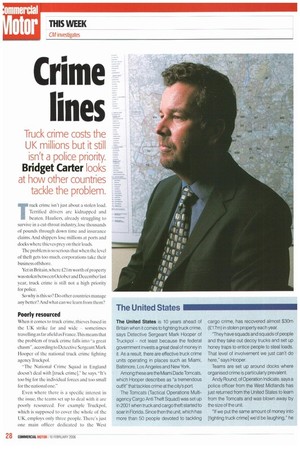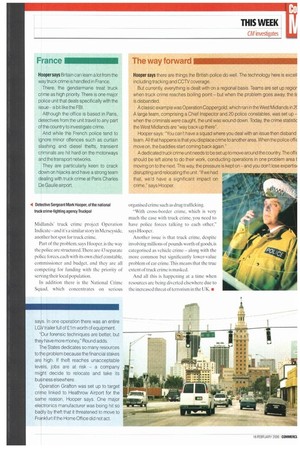Crime lines
Page 28

Page 29

If you've noticed an error in this article please click here to report it so we can fix it.
Truck crime costs the UK millions but it still isn't a police priority. Bridget Carter IooKs at how other countries tackle the problem.
Truck crime isn't just about a stolen load. Terrified drivers are kidnapped and beaten. Hauliers. already struggling to survive in a cut-throat industry, lose thousands of pounds through down time and insurance claims And shippers lose millions at ports and docks where thieves prey on their loads.
The problem is so serious that when the level of theft gets too much, corporations take their business offshore.
Yet in Britain, where i2 lm worth of property was stolen between October and December last year, truck crime is still not a high priority for police.
So why is this so? Do other countries manage any better? And what can we learn from them?
Poorly resourced
When it comcN Co truck crime, thieves based in the UK strike far and wide sometimes travelling as far afield as Francerlhis means that the problem of truck crime falls into "a great chasm", according to Detective Sergeant Mark Hooper of the national truck crime fighting agencyTruckpol.
"The National Crime Squad in England doesn't deal with [truck crime]," he says. "It's too big for the individual forces and too small for the national one."
Even where there is a specific interest in the issue, the teams set up to deal with it are poorly resourccd. For example Truckpol, which is supposed to cover the whole of the UK. employs only three people. There's just one main officer dedicated to the West Midlands' truck crime project Operation Indicate -and it's a similar story in Merseyside, another hot spot for truck crime.
Part of the problem, says Hooper. is the way the police are structured.There are 43 separate police forces. each with its own chief constable. commissioner and budget, and they are all competing for funding with the priority of serving their local population.
In addition there is the National Crime Squad, which concentrates on serious organised crime such as drug trafficking.
"With cross-border crime, which is very much the case with truck crime, you need to have police forces talking to each other," says Hooper.
Another issue is that truck crime, despite involving millions of pounds worth of goods. is categorised as vehicle crime along with the more common hut significantly lower-value problem of car crime. This means that the true extent of truck crime is masked.
And all this is happening at a time when resources are being diverted elsewhere due to the increased threat of terrorism in the UK..






































































































































































































